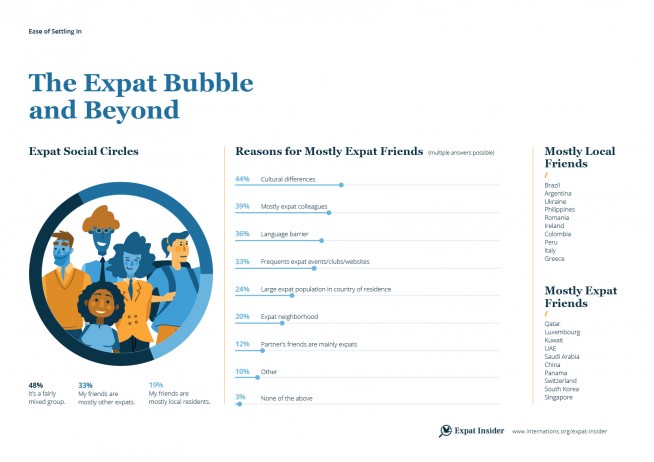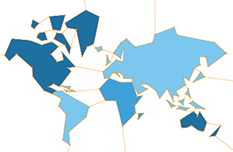Beyond the Expat Bubble
- The majority (48%) says their social circle is a mix of expats and locals.
- Men and expats over age 51 are more likely to have local friends.
- Almost three in ten (28%) had friends or family already living in their destination.
- Those living in the Gulf States are most likely to stay in the expat bubble.
Methodology
Respondents were asked about their social circle, specifically whether their friends were mostly expats. Those who said that most of their friends were expats were also asked about why that might be the case. Respondents rated how easy it is to make local friends in their current country of residence, as well as providing information about whether they already had friends and family living in their new home before moving.
Is There Really an Expat Bubble?
Survey statistics suggest that the “expat bubble” stereotype might be outdated: only a third (33%) are mostly friends with other expats, while 19% count mainly locals as their friends. The majority of respondents (48%) says that their social circle is a mix of locals and expats.
Men are slightly more likely to make friends with local residents: 22% say that the majority of their friends are locals in comparison to 17% of women. Expats age 26–35 are most likely to stay in the bubble (two out of five are mostly friends with other expatriates),while those over 51 are more likely to have local friends (27% vs. 19% across all age groups); this might be linked to the fact that two-fifths of them have already lived in their current country of residence for more than ten years.
For those who said their friends are mostly expats, the main things holding them back from making local friends are cultural issues (44%), the language barrier (36%), and having mostly expat colleagues (39%). Interestingly, language skills are mainly an issue for expats under 30 (mentioned by up to 44% in this age group).
Existing Support Networks
The majority of expats (72%) did not have friends or family living in their destination country when they made the move. However, of the 28% that did have an existing support network, 10% even had friends or family in the same city.
Moving to join friends or family seems to be more common in some countries where respondents say it’s difficult to make friends. For example, Saudi Arabia ranks 56th out of 65 countries in the Finding Friends subcategory, and 51% of expats moving there already had a support network in place.
Expats that moved for work are among the least likely to have friends or relatives already living in their destination, especially those sent abroad by their employer (19%). Interestingly, this is also true for those who moved for love, for instance joining their partner in their home country (20%).
Where Are Expats Most Likely to Stay in the Bubble?
Though most expats have a mixed social circle, there are certain countries where expats are more likely to stick together. Most respondents in the Gulf States lack local friends, with 69% of expats in Qatar, 63% in Kuwait, 61% in the UAE, and 57% in Saudi Arabia saying their friends are mostly expats. When asked why, the generally high number of expats in their host country as well as many expat colleagues were the most common answers.
Expats in Luxembourg are also unlikely to have local friends, with 68% of respondents saying their friends are mostly other expats. Much like in the Gulf States, almost eight in ten respondents in Luxembourg with mainly expat friends (78%) say it’s because expats make up a significant percentage of the population.
Trends by Nationality
Respondents from English-speaking countries are more likely to have local friends. Around a quarter of US Americans (27%), Brits (26%), Australians (24%), and Irish expats (23%) say their friends are mostly local residents. Swiss expats (28%), as well as expats from Malaysia (24%), are also more likely to have local friends.
In contrast, expats from Egypt and Pakistan are most likely to stay in the bubble. This may be due to their country of residence: Egyptians and Pakistanis are more likely to move to the Middle East, especially Saudi Arabia and the UAE. They cite a high expat population, expat colleagues, and the language barrier as reasons for their lack of local friends. These nationalities are also more likely to have existing support networks: 57% of Egyptians and 61% of Pakistanis had friends and family in the country or even in the same city before moving.
Expats from Greece, Italy, and Brazil also say that their friends are mainly expats. Respondents from these countries felt that cultural issues are one of the factors holding them back from making local friends. When looking at which countries these respondents move to, Germany and the UK are in the top 3 destinations for Greek, Italian, and Brazilian expats.
Trends by Expat Type
The reason for moving might affect whether expats make local friends. Those expat types who moved for their own or their partner’s career (Foreign Assignees, Career Expats, Foreign Recruitees, and Traveling Spouses) are more likely to say their friends are mostly expats. In fact, almost half of all Traveling Spouses (48%) are mostly friends with other expats. When asked why, those who moved for their career or partner’s career say that living in an expat neighborhood as well as having expat colleagues are the main reasons for their lack of local friends.
Those who moved for family, or romance, however, are much more likely to have local friends; almost four in ten expats that move for love say their friends are mostly local residents.
Further Reading
- Expat Insider 2017 — Finding Your Home Away from Home
- Expat Insider 2017 — Feeling (Un)Welcome
- Expat Insider 2017 — Highs and Lows in the GCC States
- Expat Insider 2017 — Fleeing the British Weather Forever
- Expat Insider 2017 — US Americans: Inexperienced Expats Relocating for Retirement
- Expat Insider 2017 — Finding Friends Not an Issue for Irish Expats
- Expat Insider 2017 — Italians Abroad: Leaving La Dolce Vita Behind
- Expats in Qatar
- Expats in Kuwait
- Expats in the UAE
- Expats in Saudi Arabia
- Expats in Luxembourg




